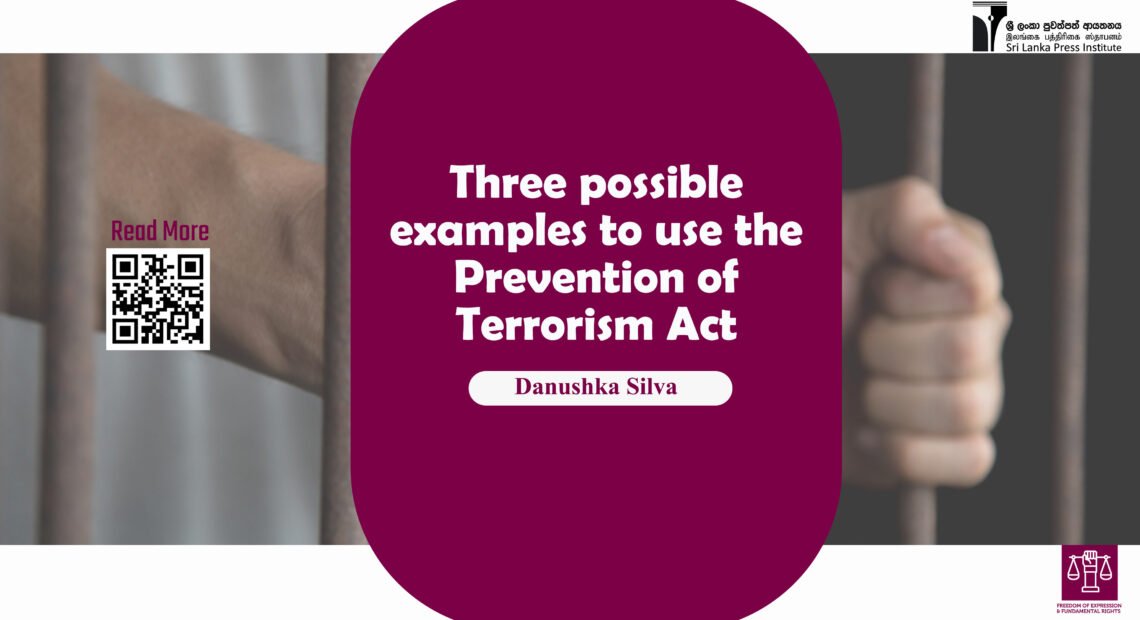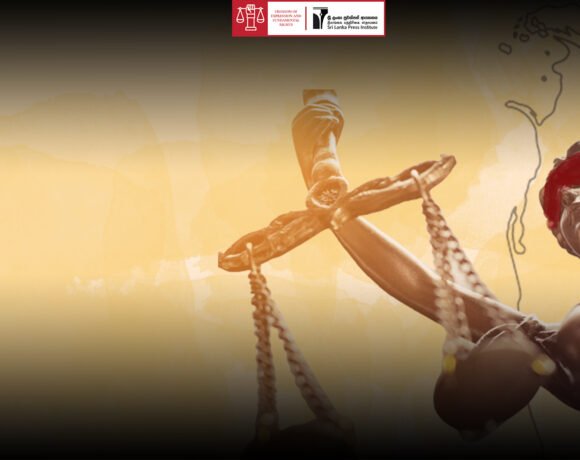
Three possible examples to use the Prevention of Terrorism Act
Danushka Silva
The Prevention of Terrorism Act was used during the for the war that went on in the country for over thirty years and it was also used to control the racist riots (especially Sinhala-Muslim) that spread in Sri Lanka after the war. Based on the Easter Passover of 2019, new laws were enacted under certain provisions of the Prevention of Terrorism Act. The purpose of this article is to identify the three trends in which the Prevention of Terrorism Law has been used this year.
The Detention of Hijaz Hezbollah
Hijaz Hezbollah, a young human rights lawyer, was arrested on 14th April this year and has been detained for over 200 days without being charged or taken to court. The arrest was initially cited to be part of an investigation into Covid-19. But seven months after the Easter Sunday inquest was launched, Hijaz Hezbollah has not yet been brought before a judge. One magistrate repeatedly expressed his displeasure over the manner in which the investigation was conducted. But he has no power to order Hijaz to be brought before the courts due to the Prevention of Terrorism Act, which is one of the most horrific laws in our country. As a result, Hijaz spends time as an inmate in a solitary confinement cell without judicial supervision. He hasn’t even been given the right to seek legal assistance thus far. In early November, the Human Rights Committee of Attorneys in England and Wales issued a statement about Hijaz, expressing their sympathy for his long-term detention without charge. The committee urged the Sri Lankan government to release Hijaz Hezbollah from detention and to take all possible steps to ensure that Sri Lankan lawyers are able to perform their professional duties without fear of harassment, intimidation or retaliation.
The Assassination of Makandure Madush
Makandure Madush was murdered while in custody under the Prevention of Terrorism Act. But the killing of a man in police custody along the way is a sign that a culture of killing people is emerging from the courts in the country. This has been stated in a letter sent to the union and the IGP by his lawyer Chaminda Athukorala. “As a civilized society that respects the rule of law, the death of criminals in the custody of law enforcement agencies without any investigation has been the subject of much recent public outcry and suspicion,” Athukorala said in his letter. “No civilized society would justify such a death,” he added.
The letter begins with the title, “The death of my client was well-planned by law enforcement officers“. The transfer of Makandure Madush from the CID to the Colombo Crimes Division on October 16th 2020 was an illegal act and has been identified as the precedent for Makadure Madush’s murder.
Madush’s detention was due to end on October 28 but his murder was carried out before that. Mr. Athukorala has brought an important legal issue to the attention of the IGP. “You are aware that my client’s detention under the Prevention of Terrorism Act was due to end on October 28, 2020” he said.
Earlier too, Madush’s wife sent a letter to the Director of the Colombo Crimes Division on October 17th 2020, stating that the manner in which her husband was arrested was illegal. Citing the letter, Mr. Athukorala called on the Bar Association of Sri Lanka to oppose as much as possible the vicious practice of killing people while in police custody.
Detention of Ahnaf Jazeem
Ahnaf Jazeem is a 25-year-old young Tamil poet. He was a resident of Silawathurai in Mannar and wrote poetry under the pseudonym Mannar Moodu Ahnaf. Similar to Hijaz, he too has been in custody for over six months under the Prevention of Terrorism Act. So far no charges have been filed against him. He was arrested on the grounds that the content of his book of poems, Navarasam, was extremist. Police initially said he had spread extremist ideas in his book published in 2017. Until the middle of this year, the poet had not been officially charged for the contents of the book.
Ahnaf’s continued detention is an abuse of powers conferred by the Prevention of Terrorism Act, according to a recent report by the Law and Society Trust. Ahnaf was arrested and detained as part of an ongoing investigation into the Easter Sunday bombings. His case is also linked to the investigation into lawyer Hejaz Hezbollah, who is currently being held without charge and has remained in detention for over 200 days.
Ahnaf Jazeem worked as a teacher at the Madurankuliya Special Needws School until his arrest. When copies of Navarasam, his book of poetry was found in the possession of the school where he taught and in the possession of students, he was arrested on charges of being a terrorist. The book of poems is also cited as evidence against Hezbollah. However, a proper translation of the book of poems has not yet been submitted to the court. After Ahnaf’s arrest, the Fort Magistrate ordered the book to be translated and sent to child psychologists at Lady Ridgeway Children’s Hospital in order to determine if children can be drawn into “extremism” through the poems. The court ordered a Sinhala translation of the book last June, but it was not received until October.








